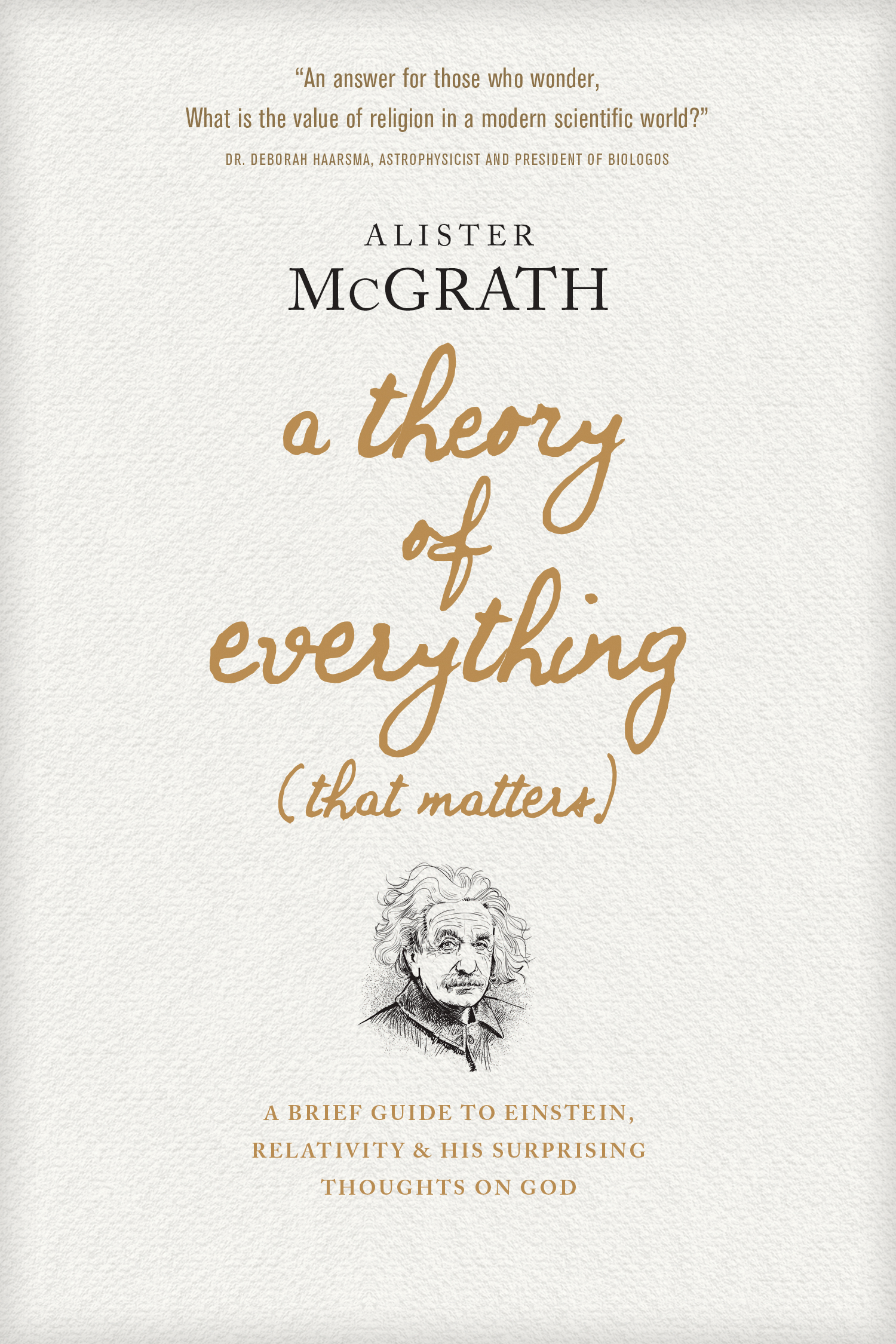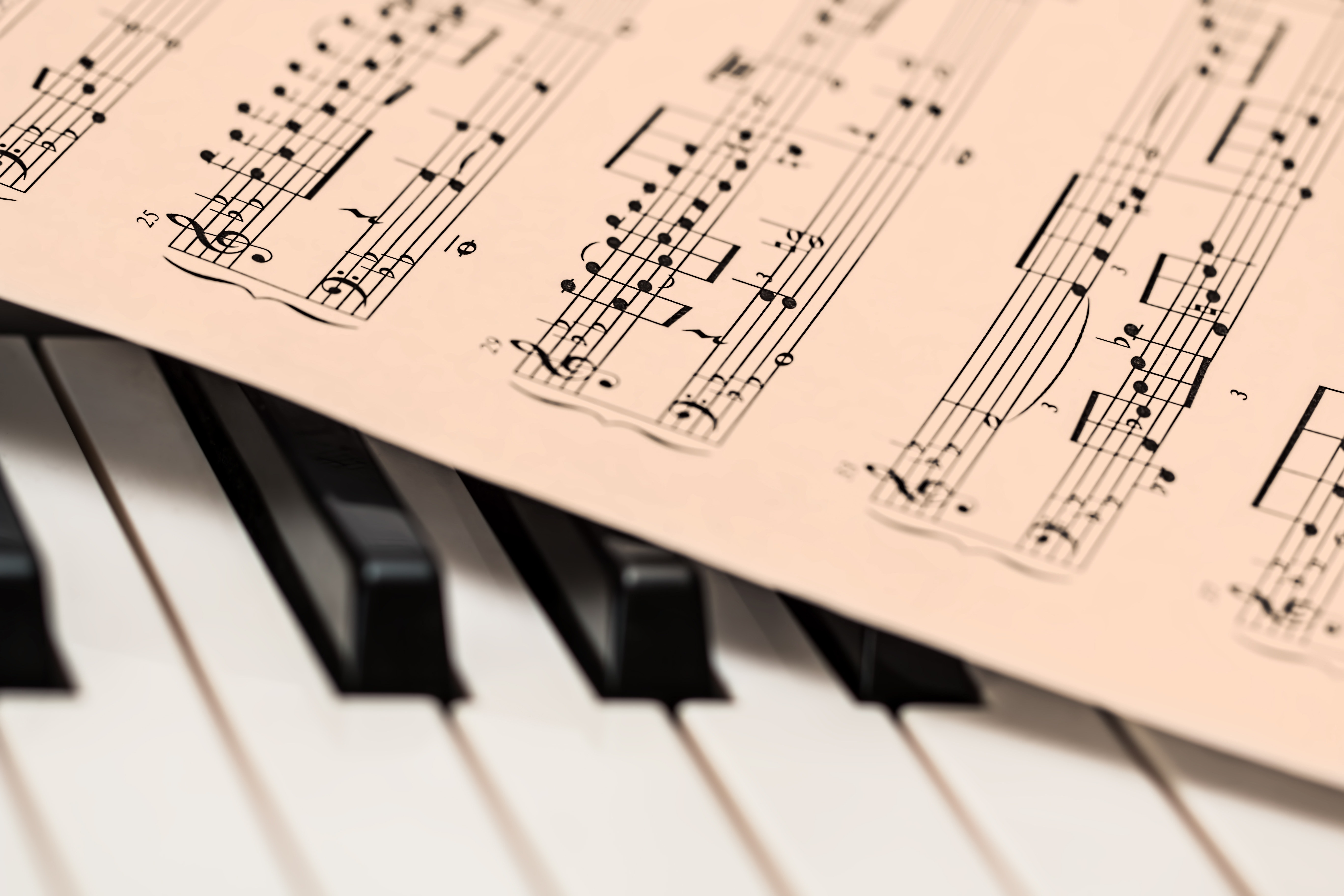Einstein loved music and frequently performed in public. . . Yet his love for music was linked with a sense that certain composers were tuning in to something deeper about our world. He said, “Mozart’s music is so pure and beautiful that I see it as a reflection of the inner beauty of the universe.”
By Alister McGrath, excerpted from A Theory of Everything (That Matters): A Brief Guide to Einstein, Relativity, and His Surprising Thoughts on God
Some scientists see their laboratories as defining their worlds. Their concern lies entirely with what happens within their walls—with experiments, calculations, and theoretical reflection. They are aware there is a world beyond the laboratory walls, yet their intellectual and personal investment lies primarily in the pursuit of science. Everything else is of secondary importance.
Einstein was not that kind of scientist. His letters bear witness not merely to his wide interests and concerns—music, philosophy, politics, and religion are frequently mentioned—but to his desire to try to bring and hold the insights of these various fields together. He was a scientist who valued his connections with other worlds of thought, worlds in which he might not personally excel or possess an international reputation but that he nevertheless regarded as important and worthwhile. For example, Einstein loved music and frequently performed in public (although it is thought that no authentic recordings of any of these performances have survived). Yet his love for music was linked with a sense that certain composers were tuning in to something deeper about our world. He said, “Mozart’s music is so pure and beautiful that I see it as a reflection of the inner beauty of the universe.”21 Indeed, he once suggested that Niels Bohr’s model of the atom was “the highest form of musicality in the realm of physical thought.”22
Might this help explain why some of Einstein’s theoretical discoveries were triggered or stimulated by music? Consider, for example, Elsa Einstein’s account of Einstein’s discovery of the theory of general relativity, which she gave when dining with Charlie Chaplin in Beverly Hills in 1931.23 Having told Elsa, sometime around 1915, that he had had a “marvelous idea,” Einstein went to his piano and began to play, every now and then making a few notes. After half an hour of this, he went upstairs to his study to work on this idea in greater detail—and two weeks later completed his theory. This suggests that Einstein saw playing classical music as a brainstorming technique, capable of stimulating his thought and helping his emerging ideas coalesce.

Yet there is a deeper question here: whether there is some fundamental harmony between human thought and the deeper structures of the universe, an idea that was often discussed during the Renaissance in terms of the “music of the spheres.” Although Einstein’s scientific papers show his commitment to traditional scientific methods, he often spoke of theoretical physics as an attempt to uncover “the music of the spheres,” which revealed a “pre-established harmony” within the fabric of the universe.24 A very similar idea is set out in the great astronomer Johannes Kepler’s Harmonies of the World (1619), which links music and astronomy in explaining the orbits of the planets.
Einstein suggested that, whereas Beethoven “created” his music, Mozart’s “seemed to have been ever-present in the universe, waiting to be discovered by the master.”25 We see this thought in one of Einstein’s scientific aphorisms: “In every naturalist there must be a kind of religious feeling; for he cannot imagine that the connections into which he sees have been thought of by him for the first time.”26 It’s a thought we find in many early modern scientists such as Galileo and Kepler: the scientist is really uncovering the rationality of God, which is expressed in the universe. The scientist’s thoughts about the universe somehow echo God’s thoughts. As Stephen Hawking pointed out in an often-quoted aphorism, to find an answer to “why it is that we and the universe exist” is to “know the mind of God.”27
So why did Einstein feel such an affinity with Mozart? Einstein’s admiration for this great composer emerged during the 1880s, long before the great Mozart revival of the first years of the twentieth century. In his study of Einstein’s core papers of 1905, the American physicist John S. Rigden suggested that Einstein’s achievement in science was comparable to Mozart’s in music.28 Both were rooted in the assumptions and conventions of their day, yet both demonstrated an intuitive leap and a new way of seeing things that lay beyond the reach of those assumptions and conventions.

Einstein’s brilliant theoretical resolution of the scientific dead ends and riddles of the opening decade of the twentieth century involved the discernment of something deeper and more fundamental that lay behind those puzzles and paradoxes. And when this deeper understanding was grasped, Rigden suggests, it allowed phenomena to be seen in a new way—and hence to be understood. Einstein did not see Mozart’s music as a soothing backdrop against which he could think without distraction. In some way, it sensitized him to something more fundamental about our universe.
So how might we be sensitized so that we might also hear this harmony? Einstein is scathing toward those who are tone-deaf to the beauty of the universe and especially to the mathematical representations of its structures, which often possess an elegance that seems to be correlated with their truth. He singles out what he terms “fanatical atheists” for particular comment, remarking that “their grudge against traditional religion as the ‘opium of the masses’” makes them unable to “hear the music of the spheres.”29
Some may feel that such references to the “music of the spheres” suggest that Einstein has lapsed into some form of mysticism. There is no good reason to think that Einstein was a “mystic” in the general sense of the word.30 However, he was certainly alert to the imaginative power of words. Like so many before him—including Newton and Kepler—he found the musical metaphor of “harmony” helpful in expressing and stimulating the study of the fundamental unity of the universe.31 Perhaps that helps us understand the somewhat unusual way in which Einstein celebrated the confirmation of his theory of general relativity in November 1919: he bought himself a new violin.
- Isaacson, Einstein, 14.
- Schilpp, Albert Einstein: Philosopher-Scientist, 47.
- Chaplin, My Autobiography, 317. I have found no record of what music Einstein actually played during this process of reflection.
- For comment, see Moszkowski, Einstein the Searcher, 222.
- Miller, “A Genius Finds Inspiration in the Music of Another.”
- Einstein, Cosmic Religion with Other Opinions and Aphorisms, 100.
- Hawking, A Brief History of Time, 193.
- Rigden, Einstein 1905, 147–49.
- Letter to an unidentified recipient, dated August 7, 1941. Einstein Archive, Reel 54-927.
- For comment, see Jammer, Einstein and Religion, 125–27.
- See Wilczek, A Beautiful Question.
 A Theory of Everything (That Matters): A Brief Guide to Einstein, Relativity, and His Surprising Thoughts on God by Alister McGrath
A Theory of Everything (That Matters): A Brief Guide to Einstein, Relativity, and His Surprising Thoughts on God by Alister McGrath
In Light of Today’s Scientific Achievements, Do We Need God Anymore?
Einstein’s revolutionary scientific ideas have transformed our world, ushering in the nuclear age. The current pace of scientific and technological progress is simply astounding. So is there any place for faith in such a world?
Einstein himself gave careful thought to the deepest questions of life. His towering intellectual status means he is someone worth listening to when we think through the big questions of life:
Can science answer all our questions?
Why is religion so important in life?
How can we hold together science and faith?
In this book, McGrath examines the life and work of Einstein, explaining his scientific significance and considering what Einstein did and did not believe about science, religion, and the meaning of life.
A Theory of Everything (That Matters) is a must-read for anyone who wants to understand the role of faith in a world where science and technology govern our lives.

